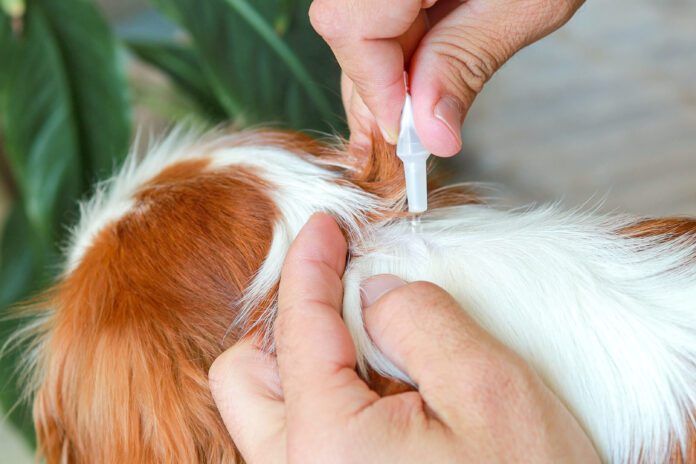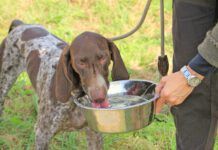Mosquitoes do bite dogs; indeed, dogs are a handy meal for them. While a dog’s thick haircoat can be a deterrent, the shorter hair on muzzles, ears, and groin areas are easy-access feeding spots for mosquitoes.
Along with an itch, a bite from a mosquito can transfer serious health problems. The best known and most common health hazard for dogs from mosquito bites is heartworm. At least 25 species of mosquitoes can transmit heartworm to susceptible dogs. Although less common than heartworm, other illnesses, including Tularemia and West Nile virus, can also be spread to dogs through mosquito bites.
A mosquito picks up heartworm when it bites a heartworm-infected dog or other animal. As the mosquito sucks up the blood, it also takes in immature heartworms, called microfilaria, which are in the blood of the animal it bites.
In the mosquito, microfilaria develops into infective larvae. This can take up to 10 to 14 days. Then, when the mosquito feeds again, it deposits those infective larvae on the skin of its victim. The larvae migrate into the bite wound and infect the animal bitten.
Early symptoms of heartworm in dogs are lethargy, a cough, and weight loss.
Reducing Mosquito Bites on a Dog
Reducing exposure to mosquitoes starts with your dog’s environment. Get rid of any stagnant water sources on your property. Mosquitoes lay eggs in stagnant water, and getting rid of the water interrupts their life cycle. Empty kiddie pools daily, dump old tires or buckets holding rainwater, and so on. If you have a pond on your property, consider using natural mosquito control such as releasing dragonflies, introducing mosquito-larva-eating fish, and planting plants that repel mosquitoes.
You can also limit your dog’s chances of getting mosquito bites by timing outdoor walks and playtimes to avoid dawn and dusk, which are prime mosquito feeding times. However, it’s important to keep in mind that mosquitoes may bite at any time, like during a walk through a moist, cool wooded area. If you’re planning on heading outdoors with your dog during mosquito season, mosquito repellents can help.
Mosquito Repellent for Dogs
Some monthly topical flea/tick treatments, like Vectra 3D and K9 Advantix II, repel mosquitoes as well as fleas and ticks. (Note: See below for information on heartworm preventatives.)
In addition, there are numerous herbal and natural products that help to repel mosquitoes. Buzzguard is a natural product that helps deter mosquitoes. Other good products include Vet’s Best and Wondercide. You may also want to try neem oil.
As always, these products should be tested first on a small area of your dog’s skin to be sure he does not have an allergic reaction.
Remember, as you have probably experienced yourself, no mosquito repellent is 100% effective, so you should still use a heartworm preventive and still reduce mosquitoes in the environment.
The Importance of Heartworm Prevention in Dogs
The single biggest threat dogs face from mosquito bites is the risk of heartworm infection. While reducing your dog’s exposure to mosquitoes reduces the chances of itchy bites and illness, it doesn’t completely eliminate the risk. That’s why it is important to regularly use a heartworm preventative for your dog.
Heartworm preventives are available with a prescription from your veterinarian. Your dog should have a screening test to be sure he is free of heartworms before you start him on a preventive. It is important to realize that heartworm cases have been found across North America. Mosquitoes can get into our homes and bite during the winter months. The American Heartworm Society recommends doing preventives all year round.
Other Mosquito-Spread Diseases in Dogs
While heartworm disease is more common and takes time to become a clinical problem, other mosquito-spread illnesses can show up quickly and be rapidly fatal. These include viruses that are more commonly associated with birds or horses.
West Nile virus, eastern equine encephalitis virus, and Venezuelan equine encephalomyelitis virus can cause serious illness in dogs, though many canine cases are mild. Neurologic signs are common. Bird and horse cases in your area may lead your veterinarian to suspect these viruses if your dog becomes ill. Treatment for these viral illnesses is supportive.






